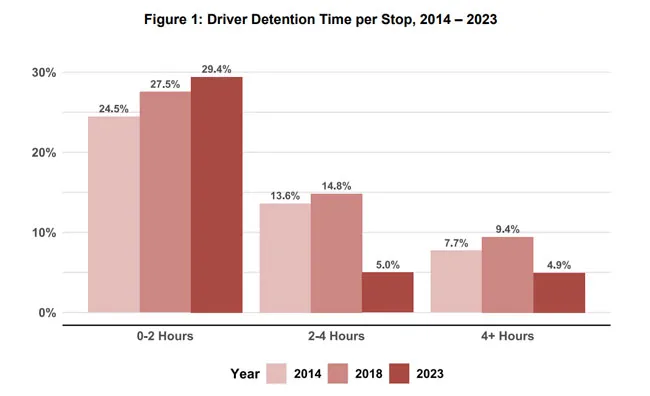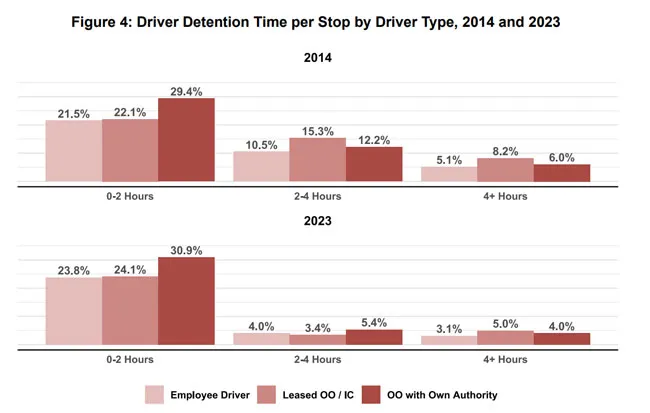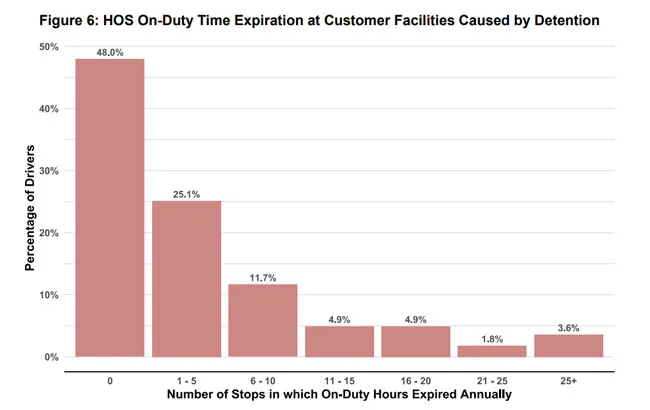Senior Reporter
ATRI Finds Truck Drivers Detained on 39% of Deliveries

[Stay on top of transportation news: Get TTNews in your inbox.]
While driver detention has decreased slightly in recent years, the overall costs of being detained at customer facilities for more than two hours remain substantial, according to a new analysis by the American Transportation Research Institute.
In 2023, drivers reported being detained during 39.3% of deliveries, resulting in major consequences for industry productivity and safety, according to ATRI’s 2024 survey of 587 drivers, released Sept. 10.
Truck driver detention is defined as the additional time a commercial motor vehicle driver must wait at a customer facility to pick up or deliver freight beyond their scheduled appointment time.
Driver detention is regularly voted as a top industry issue, ranking fifth highest for drivers in 2023, according to ATRI.

(American Transportation Research Institute)
The recent detention survey, conducted at the 2024 Mid-America Trucking Show in Louisville, Ky., offered a demographic composition similar to previous driver surveys.
Employee drivers made up 58% of respondents, while 18% were owner-operators with their own authority and 23% were owner-operators or independent contractors leased to a motor carrier. Women were 10% of the sample, and men were 88%. Among drivers, 47% operated truckload dry vans, 20% operated refrigerated vans and 28% operated other specialized trailer types.
RELATED: FMCSA Planning New Study on Detention Time
The survey author noted that some totals do not add up to 100% because of rounding, respondents who do not identify as men or women, and drivers who were unsure of their trailer type or split time evenly between types.
“Detention is so common that many industry professionals have accepted it as inevitable without realizing the true extent of its costs,” said Chad England, C.R. England CEO. “ATRI’s report puts real-world numbers to the true impact that truck driver detention has on trucking and the broader economy.”
C.R. England ranks No. 42 on the Transport Topics Top 100 list of the largest for-hire carriers in North America.

(American Transportation Reseach Institute)
The analysis concluded that while 94.5% of fleets charge detention fees, they are paid for fewer than 50% of those invoices.
“As a result, the trucking industry lost $3.6 billion in direct expenses and $11.5 billion in lost productivity from driver detention in 2023,” the analysis said. ATRI’s additional impact assessments indicate that driver detention can lead to measurable inefficiencies in the supply chain, resulting in reduced driver compensation and increased turnover rates.

(American Transportation Research Institute)
The analysis noted several additional findings, including:
- The frequency of detention was high among female drivers (49.1%), refrigerated trailer drivers (56.2%) and among fleets that operate in the spot market (42.5%).
- Based on industry-reported data, each truck driver was detained between 117 and 209 hours per year, depending on the sector. In for-hire trucking alone, the total time lost to truck driver detention exceeded 135 million hours in 2023.
- An analysis of ATRI’s large truck GPS data at different customer facility types found that detention contributes to higher truck speeds. Trucks that were detained were driven 14.6% faster on average than trucks that were not detained. Trucks were also driven faster on trips to facilities where they were detained, indicating that truck drivers know which firms and facilities will likely detain them.
- Detention can be caused by scheduling issues on the customer’s part, inadequate parking and dock space, inadequate staffing at customer facilities or upstream delays in production. In some cases, it may be caused by drivers’ late arrivals, either due to driver/motor carrier delays or to factors outside their control, such as weather or unexpected road delays.
- Strategies to reduce detention time include arriving early, trailer-based approaches, better communication with customers and even refusing service.
Want more news? Listen to today's daily briefing below or go here for more info:




